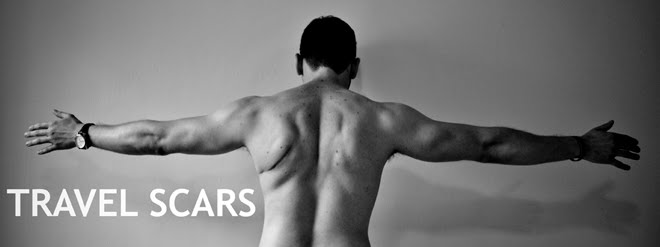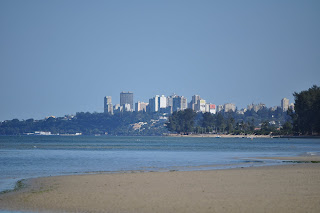July 28
th-30
thWhile we were on Ibo, we had hired a boat to take us back to mainland Mozambique in order to continue our travels north.

In northern Mozambique, the language gradually shifted from Portuguese, to a dialect in between Portuguese and Swahili, to full-on
Kiswahili (as it is known by its speakers) in the north. Up to this point we had been helped by the linguistically gifted
Meret, who is nearly fluent in Portuguese, even though she will
undoubtedly deny it.

As her prowess in Portuguese became unfortunately obsolete, our other travel companion, Stefan, who coincidentally had been teaching in Tanzania (where they also speak
Kiswahili as their official language); took over her role as our principal interpreter.
Why these details are relevant is because in northern Mozambique, due to the difficulty of travel and relatively underdeveloped infrastructure, we may have been the first white people many of these people have ever seen. Because of this, everyone was intrigued by our presence and shouts of "Whitey" and laughter abounded as we passed.

Stefan soon explained that the term
Mzungu or "white man" in Swahili was what everyone was calling us and it quickly became our new moniker. I am still not quite sure of its exact connotation, whether solely qualitative or insulting in nature, but it was very interesting to be judged or addressed primarily in terms of race.
As a Caucasian, I rarely have to put up with, nor am bothered by any racially-related terms directed at me. While I know most of the children say it out of pure
fascination, I am sure some of the adults only used it maliciously. However, I cannot blame the people because the effects of the European colonial dissection of the African continent is still very palpable today.
Racial discussions aside, we took a 4-hour
dhow ride to the delightfully laid-back, fishing village of
Pangane. Despite the lethargic nature of the village, Chris still managed to have his toothbrush, razor, flashlight, finished deodorant, bag for his sleeping bag and sunglasses stolen from our room, while we were sleeping in it! How that occurred, I have not the slightest idea.

From there, our most arduous journey would begin. Chris and I sat in the back of a flat-bed truck with close to 30 other people until the town of
Macomia. From
Macomia, we waited at the side of the road until a connecting vehicle picked us up.
This vehicle was yet another flat-bed truck, which we promptly loaded with an over-abundance of people and their luggage. This would not have been so bad except that it didn't end there. Around 30 minutes into the journey, the truck turns off the main road and ventures 30 minutes into the bush.

We arrive in a tiny village where I am positive that we are the first
Mzungus that they have ever seen. A premature rest-stop? Unfortunately not.
We unload all the people and their personal effects and
that's when they started loading the truck with large sacks of maize. After all 4-tonnes (not even kidding) of maize have been loaded onto the truck, the driver tries to make it back onto the main road. Due to the sandy composition of the road, the truck quickly sinks and becomes stuck.
All the men get off and attempt to push it, while the women remain on the back and yell how stupid of an idea it was to load all that maize in the first place. We do manage to move it, but the ground just continues to give way under the immense weight of the truck.
The driver,
Hasim, is still not discouraged and orders half the bags of corn to be removed from the truck. Finally, some common sense! Well, almost.
With the reduced weight, we manage to push it back to the main road; it too being primarily made out of sand. Incredibly,
Hasim then orders the 2-tonnes of unloaded bags back onto the truck! I plead with
Hasim, telling him that this will never work, but he assures me that it will.
I realize my efforts are futile and I sit down, feeling defeated and watch as this craziness continues. They finally get the maize back on, as well as the people and all their luggage; and we set back on the road, which I estimated to last all of 5 feet due to the
consistency of the road.
We make it over the first hurdle and actually make it back onto the main road, corn and all!
Hasim was right and it is this never-give-up attitude and eternal patience that makes the African people so incredible. Westerners would surely have given up much earlier. I know I did.
So here we were, 5 hours after our first little detour, once again sitting on the back of a flat-bed truck. Actually, we were now sitting on top of 4 tonnes of corn
on top of a flatbed truck in northern Mozambique.
You can just imagine the reaction of the locals as 4
mzungus rode atop the Maize Express, and rightfully so; it was pretty
ridiculous.
We finally reached our destination,
Mocimboa da Praia, after sundown and after having loaded another tonne of corn on top of the previous 4 tonnes. What makes this so unbelievable is the fact that our journey began at 4am that morning and we only travelled a mere 200km! Oh and the excessive amount of corn. It is no wonder why so few westerners venture to northern Mozambique.
 Hasim
Hasim had thankfully arranged a pick-up to take us to the border the following morning and we were just happy to get off that bloody corn!
We were awoken at 2:15am for our lift and we started our final trek on the route to Tanzania. As you may have guessed, shuttle services do not exist in this country, and apparently neither do road safety standards. We were picked up by a Toyota Land-Cruiser and were ordered into its pick-up. Obviously I got
jamesed and had to sit on the solid steel wheel-well.
I don't believe that the driver knew how to drive below the sound barrier because he was
literally killing it down the roads, totally oblivious to the other 12 passengers in the back of the pick-up.
Normally this wouldn't have been too much of a problem except that the roads were not paved, were not flat nor was there anything illuminating them. I therefore did what anyone else would in a similar situation: I put on my
ipod, closed my eyes and held on for dear life!
We flew over those roads at 4am, going well over 100km and hour; wild branches whipping at my arms; my back and ass bruised from lifting off the wheel-well and being slammed down over and over again.
I
grimaced, but I kept quiet, realizing full well that the Africans that were also in the pick-up felt the same pain as I did, but for them it was not a choice to be in that truck, it was their only option and they tolerated it with a calmness and quiet dignity that can only be described as remarkable.
With no other choice, I kept my eyes closed as the dust painted my face a dark-brown-colour and the wind flattened my hair. As the sun rose and the border approached, I listened to my music and thought to myself that the
people who silently sat in the back of this truck had earned their dark complexion. They earned it through generations of hardship, unwavering determination and
resilience.
I, on the other hand, was just a dirty
Mzungu.




























